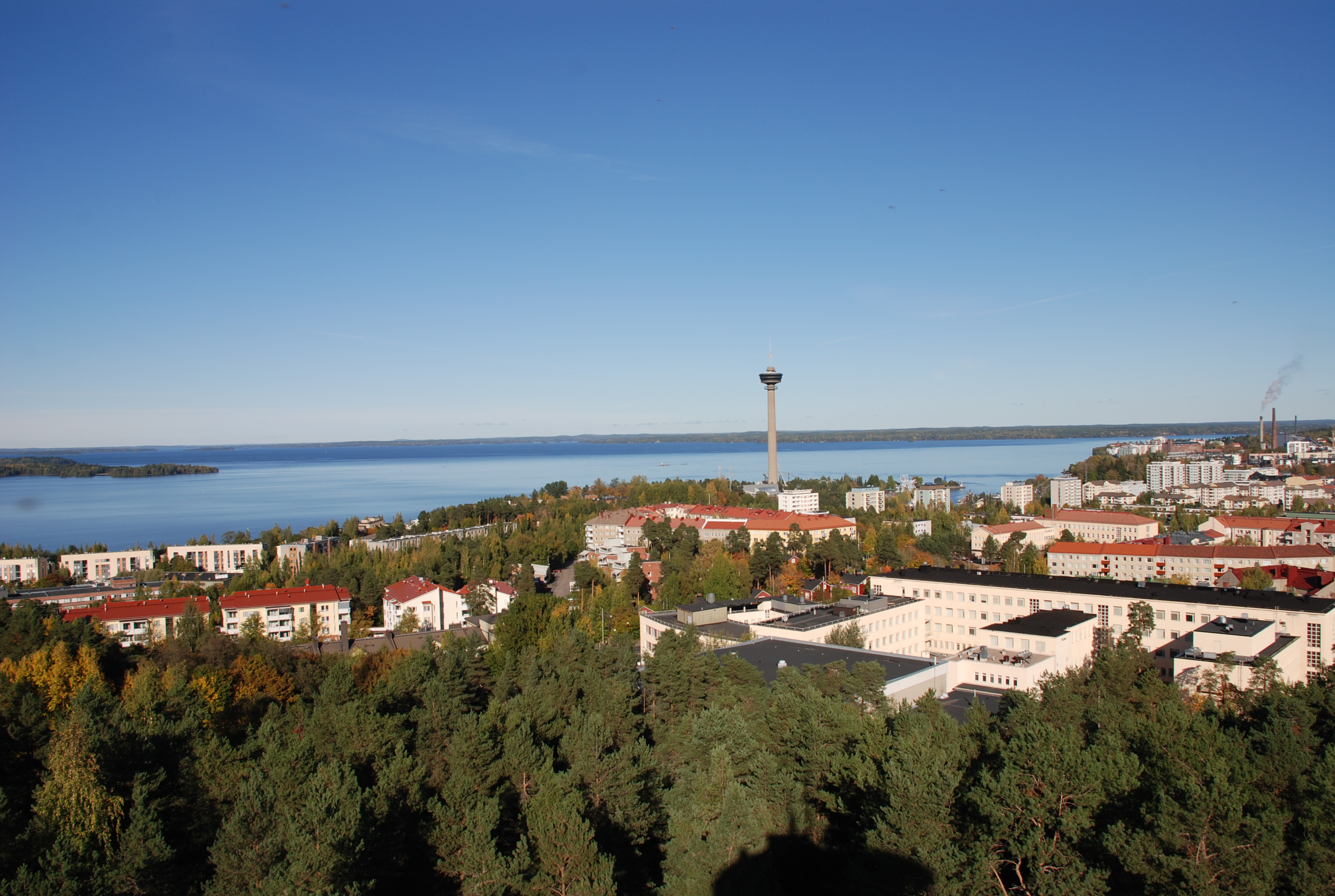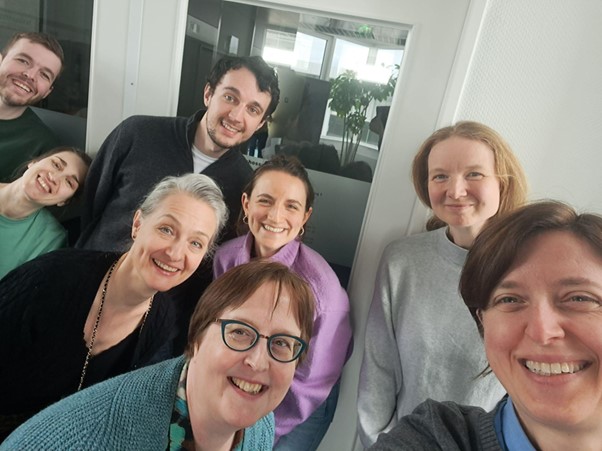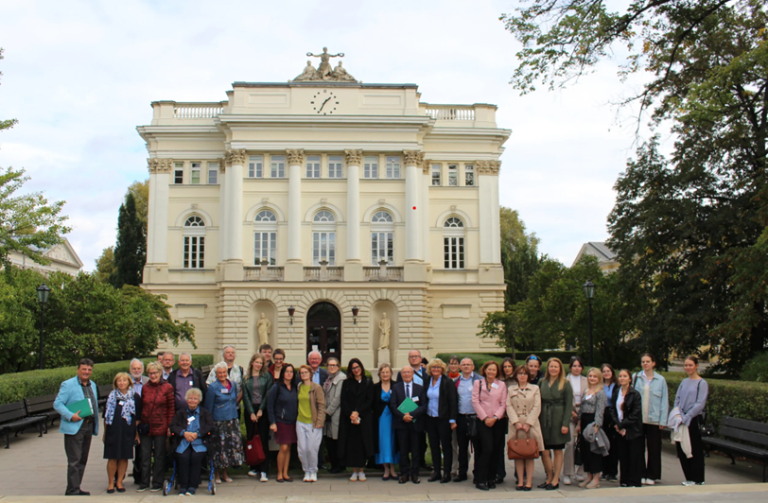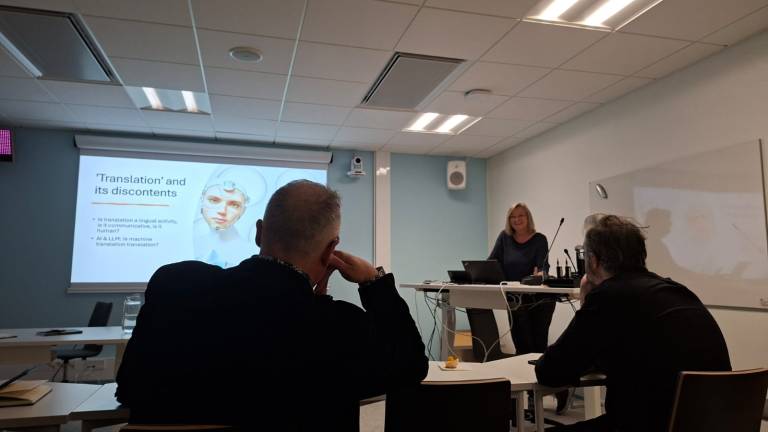Photo by Dinah K. Leschzyk. My dear colleagues from the Crisis Communication Department of the BfR. Author in the front with green eyewear.
Text by Tuija Kinnunen
Last spring, in a virtual research seminar held in Vienna, I saw Dr. Dinah K. Leschzyk presenting her work in MIRKKOMM project. As I was on a research leave and investigating Covid-19 communication from a multilingual point of view, I decided to contact her. After the permission for a research visit was granted,, I applied for a travel grant from the Emil Öhmann foundation that sponsors research in the field of German Language and Culture. Be prepared, it will soon be the yearly time to apply!
My two-month-long scholarly visit took place at the German Federal Institute for Risk Assessment that works in the field of health protection. Its task is to assess existing health risks and to identify new health risks. In this context, the Study Centre for Social Science Research, and especially the research group that I am visiting, investigate crisis communication. The group is part of a research consortium MIRKKOMM consisting of eight teams who all do research on multimodal Covid-19 communication.
The MIRKKOMM team has collected a big media corpus consisting of governmental tweets and Instagram postings during the pandemic. The goal of the analysis is to better understand the combined effect of the visual and the textual components of a governmental message, e.g., on social media, to develop and plan health communication for future crisis communication situations. In total, there are over 60 people who work in the field of risk communication at the institute, and over 20 research projects.
I have analysed translated municipal Covid-19 online communication during my visit as part of a project that researches multilingual access to information that is led by Dr. Simo Määttä in the University of Helsinki and is funded by the KONE foundation. It has been very fruitful to discuss the research questions together with the German research group and understand that they give a great value to research done in the field of Translation Studies.
The social science-oriented team is led by Dr. Annett Schulze, who has a communication studies background. In her very well-organized team, together with Dinah Leschzyk, Fabian Brand, and Alena Biegert, I learnt about running a research project, organising short lunchbreak lectures for your colleagues, getting scientific support from the experts on other teams, about dividing tasks in a systematic manner, about information storage and generally about the German way of organizing work. The team is even actively planning with their partners an exhibition at the Museum of Communication in Berlin. I have also had a chance to get acquainted with the international DECIPHER project that analyses governmental communication in the pandemic from the point of view of the citizens.
What else have I learned? I have learned, for example, a lot about diversity studies and gender issues in the German language that are a field of special interest of my colleague, Dinah K. Leschzyk. She has developed an expertise in discourse analysis, political rhetoric, intercultural communication, language politics, and discrimination issues. As an example, you can read her article about Infodemic in Germany and Brazil. How the AfD and Jair Bolsonaro are Sowing Distrust During the Corona Pandemic.
I have been asked to give a scientific talk in two research seminars which were both very well attended. There was a lot of discussion after my last presentation, with questions about machine translation and AI, about tailoring and adapting communication to target groups, about chatbots and other means and channels used in the multilingual Covid-19 communication in Finland. As there are many kinds of research backgrounds combined in such seminars, the discussions have been very fruitful. Besides, I read a lot of new stuff on communication studies in German (so enjoyable!). The visit had so many interesting aspects that I enjoyed my work as never before!
At the end of the visit, I had a chance to take part in the Crisis Prevention Conference that had speakers, for example, from the energy sector, cyber security, and from the crisis communication research. I could add that the language of communication also plays a vital part in crisis prevention, and translation forms an element in the infrastructure of a secure society.
The time in Berlin has given me a chance to enhance my understanding of German culture (if there is a homogenous one) and history, especially the time of the divided Germany and the traces of it in the people’s lives. I visited museums and exhibitions, listened to podcasts, walked around the city with eyes wide open, and read books about divided Berlin, and the time before, during, and after World War II. Finally, who would have guessed that listening to dozens and dozens of NDR Covid-19 Update Podcasts with Professor Christian Drosten from Berlin in the beginning of the pandemic would give me just the rightful dose of understanding of the German pandemic context that I could use during my time in Germany? Never underestimate listening to podcasts in your working language and in the field of your interest!




